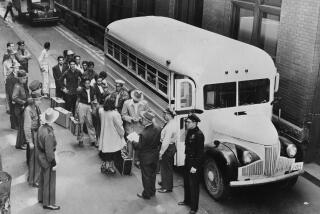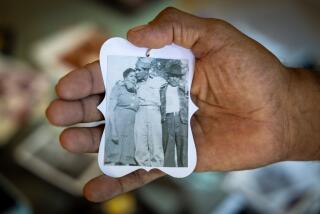Ventura’s Cross Is a Legal Hot Potato
- Share via
As real estate deals go, the offer from the city of Ventura isn’t much of a bargain.
To be sure, you would get a partially wooded hilltop acre with a drop-dead view of the coastline for a minimum bid of just $10,000.
But you wouldn’t be allowed to build your dream house there. And you would have to welcome the public onto your property day and night. To top it off, your purchase would come with its own bitterly debated constitutional issue -- a 24-foot wooden cross that has been the subject of raucous hearings and threatened lawsuits.
The cross is being targeted by a group that contends it is a religious symbol unsuited for public property. So the city has decided to sell the Grant Park structure and the land around it.
To some in this city founded around one of the original California missions, the Sept. 22 auction of Ventura’s landmark cross is as blasphemous as running Old Glory through a meat grinder. But to Barry Lynn, it’s a perfect example of how government should settle such conflicts.
For 11 years, Lynn has headed Americans United for Separation of Church and State, a Washington, D.C.-based group that has made an issue of the Ventura cross. It is also one of three organizations that challenged the Ten Commandments monument in Alabama’s state Supreme Court building.
While the showdown in Montgomery has been grist for nationally televised demonstrations and heated talk-show standoffs, less-publicized conflicts over crosses and creches have been raising the public’s blood pressure for years. With help from groups like Lynn’s, they have been popping up with greater frequency, alarming religious believers who see them as part of an effort to purge all evidence of faith from public life.
“It’s a spiritual attack by the enemy -- just the same as with nativity scenes and the Pledge of Allegiance,” said Dave Elliot, a Ventura salesman who started a local group called Concerned Christians for Crosses.
Backed by Americans United, three Ventura County residents last spring asked the city to remove the cross from the public park where it stands. But Elliot contends that so-called constitutional concern is a smokescreen. “The bottom line is that they’re trying to get rid of Christianity,” he said.
Lynn disagrees. A minister in the United Church of Christ, he hasn’t led a congregation for years but still officiates at occasional weddings and funerals.
“Any time you invoke the name of God, you’re doing something of great significance,” he said. “That’s why it’s important that government shouldn’t be involved with it.”
In fact, Lynn sees the rising tide of legal actions over religious issues more as testament to democracy’s health than to religion’s demise. Emboldened by increasing diversity in their communities, people with minority views “are a little more willing and able to take their cases to court,” he said.
“We’ve engaged in many more lawsuits over the last three or four years,” Lynn said, adding that many of the group’s cases are resolved, like Ventura’s, without filing suit.
Besides the case in Alabama, Americans United is working against four other Ten Commandments displays around the U.S. It also is taking on school vouchers in Florida and mandatory prayer at the Virginia Military Institute, while fighting for the right of a Wiccan -- a believer in a faith modeled after ancient pagan religions -- to deliver an invocation before a county board in Virginia. Such cases have changed the American spiritual landscape.
In a remote corner of the Mojave National Preserve, ranchers gathered for an annual Easter sunrise service before a 6-foot-tall cross that had been hidden under a white tarp by the National Park Service. Five miles from the nearest ranch, the white metal cross is the most recent version of one set up in 1934 to honor World War I veterans.
Last year, the American Civil Liberties Union won a suit to have it removed, citing constitutional guarantees against the state favoring one religion. The case is under appeal.
“All these years it’s been there and no one bothered with it,” said Wanda Sandoz, a retired school-bus driver who with her husband Henry takes care of the monument. “What’s made this country great is we’ve always honored God. Now we’re taking God out of it.”
More prominent crosses on parkland in San Diego and San Francisco are among those that have been the subject of similar suits.
Court rulings in such issues have not always been consistent.
“It’s a very frustrating area of law for both sides,” said Denise Lieberman, legal director of the ACLU in St. Louis. “Without more adequate guidance, how is a city to know when it’s crossing the line?”
In 1997, the ACLU complained to the city of Florissant, Mo., about a large manger scene placed each December near the entrance to City Hall. The city responded by adding plastic candy canes, Frosty the Snowman and other seasonal symbols, hoping to make the scene more secular and meet the standards laid out for such displays in a 1989 U.S. Supreme Court decision.
A federal judge ruled against the city in the ACLU’s lawsuit, but an appeals court overturned that ruling.
“The courts seem to be saying that if you put up enough candy canes, a nativity scene loses its religious meaning,” Lieberman said. “That should be an insult to people with deep religious faith.”
In Ventura, supporters of the cross emphasized its value as a piece of history. For the better part of more than 200 years, a cross had stood atop that same hill. According to local lore, the first was planted in 1782 by Father Junipero Serra, the mission’s founder.
“The Ventura cross would have been an excellent candidate to go before the Supreme Court,” said Brad Dacus, whose Sacramento-based Pacific Justice Institute takes on legal challenges to religious expression. “It’s literally at the foundation of the city.”
Based near Sacramento, Dacus’ group has fought for establishment of Bible clubs in public schools, the right of students in Reno to hand out “Jesus Loves You” candy canes, and the right of a Nevada water district to keep “God Bless America” on its bills.
Dacus’ group offered Ventura a volunteer attorney for the cross case, but the city declined.
Officials were convinced they would lose in the Court of Appeals. If that were to happen, they were uncertain that the Supreme Court would agree to hear the case.
More to Read
Sign up for Essential California
The most important California stories and recommendations in your inbox every morning.
You may occasionally receive promotional content from the Los Angeles Times.











